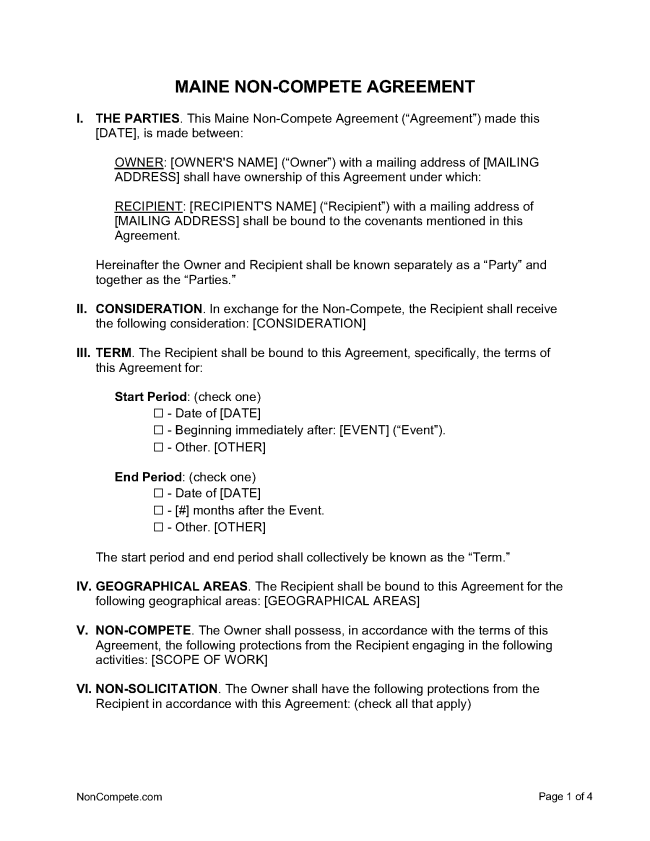A Maine non-compete agreement limits what work an employee may do once leaving a previous employer. Maine created a new set of statutes that control non-compete agreements in 2019, with no reported cases interpreting those statutes. As a result, there is relatively little guidance about non-compete agreements in Maine.
Table of Contents |
Are Non-Competes Enforceable in Maine?
In limited circumstances, yes. Non-competes in Maine are enforceable if they are:
- Reasonable, and
- No broader than necessary to protect a legitimate business interest of an employer.
Me. Rev. Stat. tit. 26, § 599-A(2).
Legitimate Business Interest
The following are considered legitimate business interests:
- The employer’s trade secrets
- Information belonging to the employer that is confidential but does not qualify as a trade secret
- The employer’s goodwill
Me. Rev. Stat. tit. 26, § 599-A(2).
“Trade Secrets” are defined by Maine’s Uniform Trade Secrets Act.
“Goodwill” can include customer lists as well as contacts and relationships with customers built up during the employee’s time working for the company. (Chapman & Drake v. Harrington (1988)).
Sale of Business vs. Employment Contract
Maine’s non-compete agreement statutes focus on employment contracts, and many states treat non-competes found in contracts for the sale of a business more leniently. It is unclear if this is the case in Maine because most cases dealing with non-competes that are part of the sale of a company are pretty out of date.
Lord v. Lord (1983) involved the sale of an insurance business and held that a seven-year non-compete agreement covering 60 miles was not reasonable, but a judge ordered the agreement in a divorce settlement, not negotiated by the parties, so it’s not clear how applicable the case is.
Disclosure and Notice
The employer must disclose this information before extending an offer if signing a non-compete agreement is a condition of employment. Me. Rev. Stat. tit. 26, § 599-A(4).
The agreement must be available at least three days before the employee is required to sign the employment contract. Me. Rev. Stat. tit. 26, § 599-A(4).
Effective Date
Except for agreements involving allopathic and osteopathic physicians licensed by the state, non-compete agreements cannot become effective until at least one year after the employee began working at the firm or six months after the agreement was signed, whichever is later. Rev. Stat. tit. 26, § 599-A(5)
Prohibited Workers
Employers may not impose a non-compete agreement on workers who earn less than four times the federal poverty level. Me. Rev. Stat. tit. 26, § 599-A(3).
Non-compete agreements found in employment contracts or partnership agreements that limit a lawyer’s ability to practice are not enforceable, except for limited agreements concerning retirement benefits and reasonable restrictions in contracts for the sale of a law practice. Rule 5.6(a), Maine Rules of Professional Conduct.
Attorneys cannot settle cases in a way that limits their right to practice or represent clients in the future. Rule 5.6(b), Maine Rules of Professional Conduct.
Terminating an Employee
Maine courts have not determined whether terminating an employee makes a non-compete agreement unenforceable. (OfficeMax Inc. v. Sousa (2011)).
Burden of Proof
A non-compete agreement may be presumed necessary if the employer’s legitimate business interest cannot be protected by a different type of restrictive covenant, such as a non-solicitation or non-disclosure agreement. Me. Rev. Stat. tit. 26, § 599-A(2).
Continued Employment (consideration)
In Brignull v. Albert (1995), the Maine Supreme Court ruled that continued employment was adequate consideration to support a non-compete agreement.
That rule likely remains in effect. However, if the job is one where the employee makes less than four times the federal poverty level, the agreement would not be enforceable under § 599-A(3).
Maximum Term
The duration of a non-compete agreement is one factor in deciding whether the agreement is reasonable and thus enforceable, along with the territory covered and the interests it is trying to protect. (Chapman & Drake v. Harrington (1988))
Chapman & Drake upheld a five-year non-compete agreement with no geographic limitations that only prohibited the employee from soliciting or accepting the former employer’s customers.
Blue Penciling (allowed)
Non-compete agreements will be enforced to the extent that they are reasonable. (Lord v. Lord (1983))
If a court is deciding whether to “blue pencil” an agreement, it will consider what the party seeking to enforce the agreement is seeking if it is narrower than what the agreement states. Brignull v. Albert (1995).
